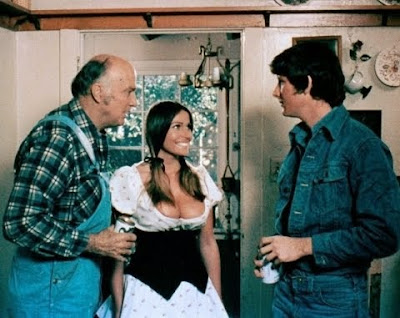Whiplash
Current Oscar contender WHIPLASH is certainly one of the most intense films ever made in which jazz is an integral (yet also incidental) part of the story. Charlie Parker's name is dropped many times during this feature, and most cinematic explorations of his or similar luminaries' lives and music that I've seen are more typically low key character studies with leisurely paces. WHIPLASH by contrast is a relentless collection of near pornographic shots of musical instruments being played and sometimes abused, alternating with exchanges of combustive anger, mostly between ridiculously talented first year music student Andrew Neimann (Miles Teller) - who favors the drums- and sadistic conductor Terrence Fletcher (J.K. Simmons). Andrew aspires to be the next Buddy Rich, who by many accounts was a fiery son of a bitch, so maybe the intensity of this film is appropriate.
Fletcher is a real martinet, a bullying perfectionist who only speaks calmly long enough to feign interest in your family history so as to later use it as ammunition while he dresses you down. I have referenced FULL METAL JACKET a few times lately, and it was impossible not to be reminded of R. Lee Ermey as Simmons screams and connives his way through this ferocious performance, a real surprise from a character actor who usually plays congenial types. Fletcher's psychological games/torture will doubtless remind some viewers of old bosses or maybe even past lovers. Possibly former grad school preceptors.
Fletcher leads the jazz ensemble at the prestigious Shaffer Conservatory in NYC, hurling (with creative and sometimes wince inducing obscenity) insults and even objects at his players. There is a painfully uncomfortable scene as Fletcher demands a player, an overweight sad sack, admit he was out of tune during a run through. When he finally, tearfully breaks down and is ejected, we learn that it was in fact a different player who hit a wrong note. To Fletcher, that the poor kid didn't know he wasn't out of tune is "bad enough."
Nineteen year old Andrew becomes Fletcher's favorite target for the rest of the film, subjected to torrents of verbal abuse but also the physical torture he inflicts on himself. It is not uncommon to see blood mixed with the sweat that pours onto his kit as he obsessively practices as he listens to - and plays in front of a poster of - his hero Mr. Rich. Andrew also memorizes the entire chart to Hank Levy's composition "Whiplash", a piece that will be be highly "instrumental" in the plot.
Early on in WHIPLASH, Andrew is shown to be a shy, eager to please kid, going to the movies with his gentle father (Paul Reiser) and finally asking the cute girl behind the consession counter (Melissa Benoist) on a date. He seems well adjusted, but after a few lashings by Fletcher (and repeated muscular performances on the drums), he transforms. He becomes impatient, elitist, singularly driven. Andrew dismisses his family and wrecks what appears to be a promising romance. Has Fletcher inspired him to hone his gift, even with Draconian methods more reminiscent of a football coach or gunnery sergeant? To be so focused as to denounce everything else, especially the need for validation? "There are no two words in the English language more harmful than 'good job'", Fletcher offers the young man in a quieter moment. How will Andrew become the next Buddy Rich otherwise?
But don't mistake writer/director Damian Chazelle's films as some typical underdog/fight-to-realize-your-dreams saga. This is a harsh, bitter motion picture that eschews the usual clichés at nearly every turn. Maybe a little too harsh. At times, WHIPLASH gets a bit carried away to makes its points, portraying moments that fly over the top, as when Andrew races to an important competition. The series of events are so unlikely that I began to think that Chazelle had little interest in creating a believable scenario and was going for something patently allegorical.
There is strong evidence that WHIPLASH really isn't about a singlemindedness to follow your goals, or even about jazz. It might be a study of illness, masochism. About an individual who continually subjects himself to abuse because it gives him purpose, maybe even satisfaction. Miles receives from Fletcher what no one else gives, repeated denigration. You can argue, and maybe this is Chazelle's point, that a refusal to offer encouragement is how Fletcher molds the next Buddy Rich or Charlie Parker. And that Miles himself will have to become a self-flagellating misanthrope to stay there. It would be a good study to observe both men struggling with their, as a relative of mine put it, "ego identification....recognizing the identification with a fixed self..." Here, geniuses. And pretty damaged.



Comments